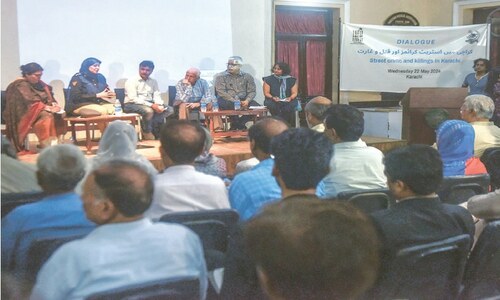KARACHI: The Counter-Terrorism Department (CTD) of Sindh police is likely to recommend the cases of 227 undertrial prisoners belonging to banned militant outfits for military trial, said CTD SSP Omer Shahid Hamid on Thursday.
The decision was taken after the recent escape of two high-profile militants affiliated with the banned sectarian outfit Lashkar-i-Jhangvi from Central Prison Karachi, said the officer while speaking at a press conference at his office.
Their military trial was necessary when such hardcore militants had created an “intimidating atmosphere” in the prison where they acted as ‘dons’ while cases against them had been pending trial before antiterrorism courts for the past many years, he added.
Alarm over influence of banned outfits inside central prison
Prisoners’ shifting
Some three months ago, the CTD had written a letter to the relevant authorities asking them that around 60 UTPs, including the two LJ militants who had recently escaped from the prison, should be moved from Karachi to jails in other parts of Sindh, he said.
There were several reasons for this recommendation, the officer disclosed, explaining that the CTD had apprehensions that the militants might reactivate their networks in the metropolis. He said the recent escape of Mumtaz Shaikh and Ahmed alias Munna, who had been allegedly involved in more than 60 murders, from the Central Prison Karachi vindicated their stance.
Besides, Mumtaz Shaikh was a roommate of Hafiz Qasim Rasheed, who was operating his own faction of LJ in Karachi.
He said Rasheed was arrested around five years ago but his case had not been decided so far.
Apart from 227 UTPs, there are 34 convicted high-profile militants linked with banned outfits, including Akram Lahori of the LJ, he said.
Akram Lahori had been convicted some 15 years ago but his appeal against the conviction was yet to be decided, the officer added.
Undue favours
“The conduct of high-profile militants in the prison was alarming,” said SSP Shahid. In fact they acted like dons in the jail where the staff was fearful of adverse consequences in case of not giving them undue favours, he added.
Being a member of the CTD team probing the recent jailbreak, SSP Shahid said that there were “security vulnerabilities” inside the prison. He said no evidence had emerged during the investigation to indicate that the two escaped militants had threatened the jail staff or their families, but their past role showed that they had been involved in hurling threats at and killing prison staff and prosecutors.
Rangers’ raid may hamper probe
In reply to a question, the officer said that the recent Rangers-led operation in the central prison might “hamper” their investigation into the jailbreak, as it was not known what sort of things were collected from the room of the escaped prisoners.
Responding to another question, SSP Shahid said the CTDs of Sindh and Balochistan were in the process of developing close coordination against the operations of banned militant outfits in border areas. He said this coordination had become necessary after the Sehwan shrine bomb blasts and other explosions in the northern parts of Sindh, particularly Shikarpur and Jacobabad.
He said the CTD of Sindh police had recently conducted a few raids in the bordering areas of Balochistan in coordination with local police there.
Speaking to Dawn, CTD chief Additional IG Dr Sanaullah Abbasi said a list of high-profile UTPs obtained from jail authorities had been sent to the DIGs (Range) for vetting before sending the cases to military courts with sound evidence.
Of these undertrial prisoners, 83 militants belonged to Sipah-i-Sahaba Pakistan, 65 belonged to Lashkar-i-Jhangvi, 18 to Sipah-i-Mohammad, 12 to Al Qaeda in the Indian Subcontinent and seven to the self-styled Islamic State.
Some of these cases have been pending for the past 10 years.
“We are concerned with early disposal of cases, whether by military courts or civilian courts,” said Dr Abbasi, adding that the CTD had also proposed to the authorities concerned that civilian courts, like military courts, should adopt a procedure to decide cases within a month without any adjournments.
The CTD chief disclosed that they had decided to place the names of acquitted or bailed militants on the Fourth Schedule to monitor their activities.
Apart from militants of the banned outfits, the CTD is also planning to send the cases of 23 suspects affiliated with a party, who were allegedly involved in the targeted killing of religious personalities, to military courts for trial.
Published in Dawn, June 23rd, 2017














































Dear visitor, the comments section is undergoing an overhaul and will return soon.